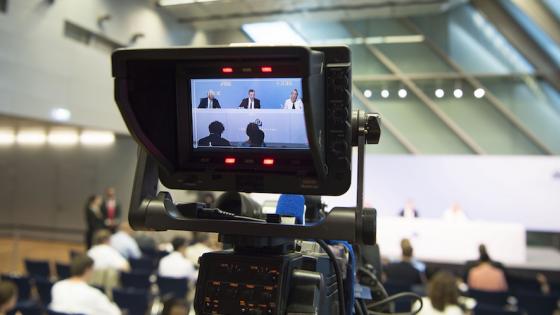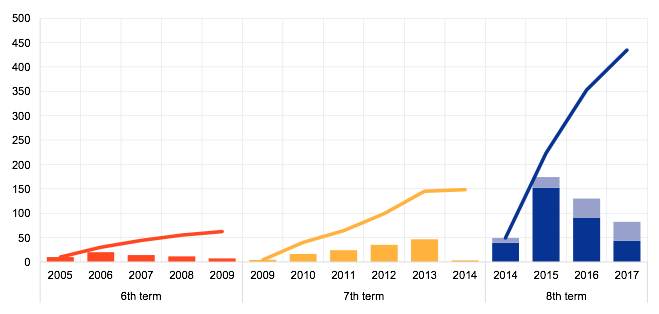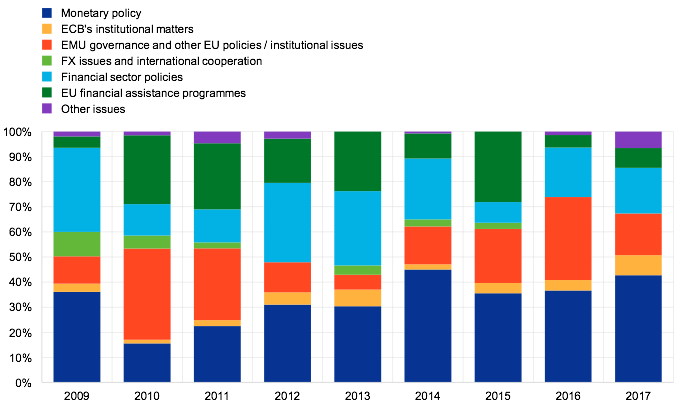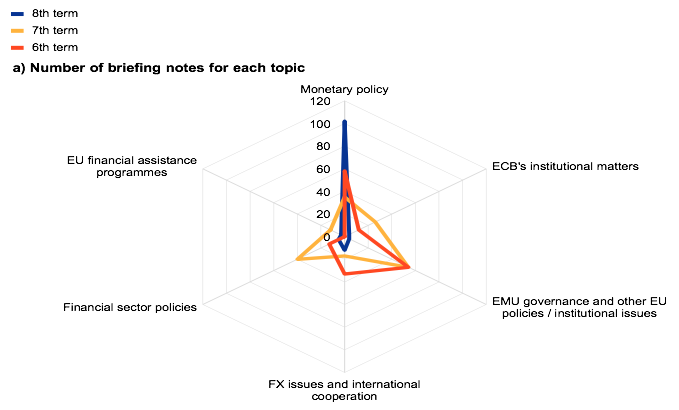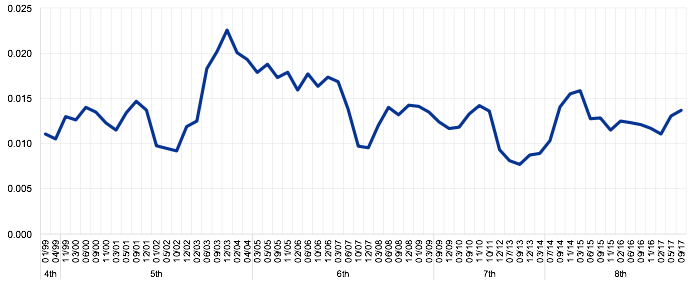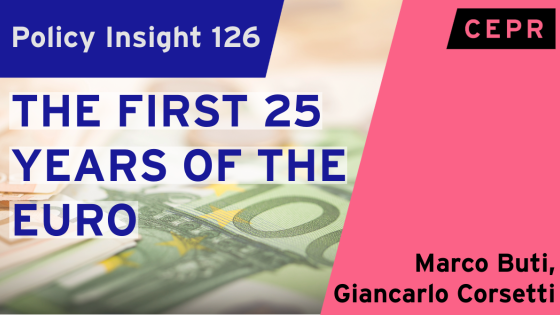During the past 30 years, independence has been a cornerstone of central banking (De Haan et al. 2017). Since the Global Crisis, however, there has been debate over whether it is legitimate to grant independence to unelected powers in a democracy (Tucker 2018, Goodhart and Lastra 2017, 2018).
As a result, increased attention has been paid to central bank accountability – in other words, the obligation for the central bank to explain and justify decisions to citizens and their elected representatives –as the necessary counterpart to independence (Eijffinger and Masciandaro 2018).
The ECB now has specific accountability arrangements for its new tasks as a banking supervisor, but the Treaty framework governing accountability has not changed. Some conclude that the ECB’s accountability had not adjusted to the new policy environment (Transparency International EU 2017). Most of the empirical analyses on the topic, however, use de jureaccountability indices to assess its evolution, which cannot capture all relevant aspects of central bank democratic accountability (De Grauwe and Gros 2008).
In a recent ECB Economic Bulletin article (Fraccaroli et al. 2018), we went beyond the traditional indexes to provide new evidence on the strengthening of the ECB’s accountability, and how it has taken shape in the context of its relationship with the European Parliament (EP). In particular, our analysis of its accountability practices shows that the ECB and the EP, building on Treaty provisions, have reacted to the challenges of the crisis by increasing the intensity and focus of their interactions, while preserving a constructive tone.
Intensity
The frequency of the exchanges between the two institutions increased substantially during the Global Crisis, as the ECB president's quarterly hearingsbefore the EP were complemented by additional ad hochearings (for example, on EMU governance reform or EU financial assistance programmes). The number of written questions addressed to the ECB by MEPs has also increased substantially during the past two legislative terms (Figure 1).1 This suggests that written questions played a complementary role to the quarterly hearings, enhancing the ECB’s accountability.
Figure 1 Number of replies to MEP written questions
Notes: Number per year and cumulative totals, by parliamentary term. The shaded blue areas represent written questions on supervisory matters.
The EP’s own-initiative report on the ECB’s activitieshas been increasingly used to channel remarks to the ECB.While this parliamentary tool has existed since 1999, the upward trend in the number of amendments proposed by MEPs suggests that it has become increasingly important from their perspective.
Moreover, in 2016, in response to an explicit request from the EP, the ECB began to publish its feedback. This MEPs to gain additional insights on the ECB’s stance on a number of policy matters.
Focus
The intensification of the interactions between the ECB and the EP has been accompanied by an increased focus on monetary policy aspects in the President’s quarterly hearings (Figure 2).
Figure 2 The ECB president has been asked his view on a broad range of issues during ECON hearings
Note: Questions asked by MEPs during quarterly ECON hearings, by topic, percentages.
Since 1999, before each hearing, the EP commissions briefing papers from a panel of experts. Some critics have noted in the past that the requests for advice from experts by the EP did not focus enough on monetary policy (Wyplosz 2014, Sibert 2014). Nevertheless, in recent years parliamentarians have focused their requests much more on monetary policy aspects (Figure 3).
Figure 3 On which subjects did MEPs seek expert advice before and after the Global Crisis?
Notes: Topics chosen by parliamentarians to receive advice from experts in preparation for the hearings with the President, by legislative term (Q3 2004 to Q1 2018). Owing to rounding, percentages may not add up to 100%.
Tone
Finally, a number of commentators have argued that the rise of populism after the global crisis put the independence of central banks at risk (for a review, see Merler 2018). This rise, nevertheless, does not seem to have affected the tone of the discussion during the ECB President's hearings, which remained positive, if we analyse the content using the literature on text sentiment analysis (Figure 4).This suggests that the regular hearings serve as a useful platform for constructive dialogue between the ECB president and the parliamentarians, even during a crisis.
Figure 4 ECON hearings sentiment ratio, 1999-2018
Note: Sentiment ratio for transcripts of ECON hearings, by year and by parliamentary term.
Responding to public demand
In this column, we have provided some evidence of how, within the existing framework, the ECB and the European Parliament have increased the intensity and focus of their exchanges in response to the demand for greater scrutiny that emerged from the crisis.
While the Treaty provisions on accountability have remained unchanged, a new accountability framework has been created in order to cater for the new supervisory tasks entrusted to the ECB. And within the existing framework, the ECB and the EP have increased the frequency of their interactions, innovated on format and increased the focus of exchanges in response to the demand for greater scrutiny of the ECB’s actions. On one hand, this has resulted in an enhanced use by the EP of the accountability instruments at its disposal. On the other hand, the ECB also has an interest in strengthening its accountability to the EP as part of an effort to explain its policies in a more complex environment.
Despite these evolutions, there is still high public demand for increased scrutiny. There has been an increase in public awareness of the ECB, and the Eurobarometer reports that trust in the ECB has been recovering gradually since 2014.[2] Communicating more broadly enhances the general public’s understanding of financial and economic interrelations, and also helps them better understand the ECB’s policies (Coeuré 2017). But parliamentary scrutiny of central bank actions is still indispensable so that the ECB is accountable to citizens. This scrutiny contributes to public trust, which is itself an essential foundation of central bank independence.
Authors’ note: The views expressed are those of the authors and do not necessarily reflect those of the European Central Bank.
References
Coeuré, B (2017), “Independence and accountability in a changing world”, speech at the Transparency International event “Two sides of the same coin? Independence and accountability of the European Central Bank”, Brussels, 28 March.
De Grauwe, P and D Gros (2008), “Accountability and Transparency in Central Banking”, study for the European Parliament’s Committee on Economic and Monetary Affairs.
De Haan, W, M Ellison, E Ilzetzki, M McMahon, and R Reis (2017), “The future of central bank independence: Results of the CFM–CEPR Survey”, VoxEU.org, 10 January.
Eijffinger, S C W and D Masciandaro (2018), Hawks and Doves: Deeds and Words - Economics and Politics of Monetary Policymaking, a VoxEU eBook.
European Commission (2017), Eurobarometer No 88, December.
Fraccaroli, N, A Giovannini and J Jamet (2018) “The evolution of the ECB’s accountability practices during the crisis”, ECB Economic Bulletin 5.
Goodhart, C and R Lastra (2017), “Populism and Central Bank Independence”, Open Economies Review 29(1): 49‑68.
Goodhart, C and R Lastra (2018), “Potential threats to central bank independence”,VoxEU.org, 11 March.
Merler, S (2018), “Central banks in the age of populism”, Bruegel blog.
Sibert, A (2014), “Monetary Dialogue 2009‑2014: Looking Backward, Looking Forward”, in Monetary Dialogue 2009‑2014: Looking Backward, Looking Forward – Compilation of Notes, European Parliament.
Transparency International EU (2017), Two sides of the same coin? Independence and accountability of the European Central Bank, Transparency International.
Tucker, P (2018), Unelected Power: The Quest for Legitimacy and the Regulatory State, Princeton University Press.
Wyplosz, C (2014), “The Monetary Dialogue”, in Monetary Dialogue 2009‑2014: Looking Backward, Looking Forward – Compilation of Notes, European Parliament.
Endnotes
[1] The answers to these questions are signed by the ECB President, and published on the ECB and the European Parliament websites.
[2] The latest Eurobarometer survey (November 2017) found that 39% of euro area respondents trust the ECB (the highest level since autumn 2011), and 47% did not trust it. Others did not know. Source: European Commission (2017).
